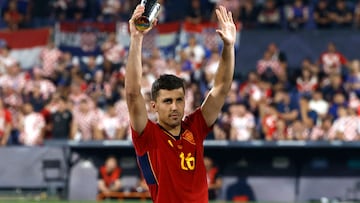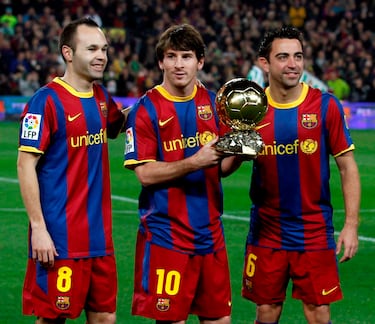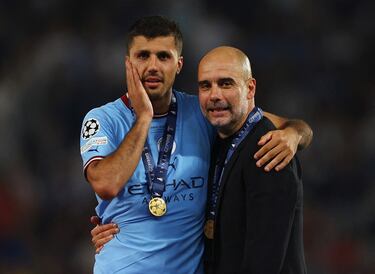Could Spain provide the 2023 Ballon d’Or winner?
The treble with Manchester City, the Nations League with Spain and two final MVPs have some people talking up Rodri’s chances.

Rodrigo, born on June 22, 1996, will feel like he’s living a dream this Thursday as he blows out the candles on his cake. Embarking on a remarkable journey, the Man City midfielder from Madrid can proudly reflect on his incredible season, featuring 65 games and 5,276 minutes played. Despite ending up exhausted, with his socks down, on a Dutch pitch, he achieved a hat-trick of trophies with Pep Guardiola and added the icing on the cake by winning the Nations League. But that’s not where it ends.
Rodri’s individual awards follow team achievements
Rodri scored the decisive Champions League goal in the Istanbul final against Inter and was handed the Most Valuable Player award for that game. Additionally, he scored in the penalty shootout during the Nations League final against Croatia and was again voted as the tournament’s MVP.
Now, Rodrigo can feel confident of treating himself to a fancy new suit because, barring any surprises, he is more than likely to be voted as the UEFA Player of the Year. If that happens, he will become only the second Spaniard, following in the footsteps of Andrés Iniesta in 2012, to achieve this honor. And there’s more in the pipeline.
🏆🇪🇸 Spain win the Nations League!
— AS USA (@English_AS) June 18, 2023
Check out how the drama unfolded with @j4brennan https://t.co/U0hTC9k2Fu
His triumphant year with his teams, coupled with his individual growth and influential performances against prominent clubs and national teams such as Bayern Munich, Real Madrid, Inter, Italy, and Croatia, position him as one of the top, if surprising, contenders for the prestigious Ballon d’Or award. Although Lionel Messi, with seven Ballon d’Or wins already in the cabinet, will also be in the running after his World Cup victory with Argentina, PSG’s underwhelming season in the Champions League might overshadow him, especially with his move to Inter Miami diluting annual returns. Rodri will also face competition from his own team, of course, as Erling Haaland having had an outstanding debut season in the Premier League.
Spain and the Ballon d’Or
Despite some outstanding years domestically and on the international scene, Spanish football hasn’t claimed a Ballon d’Or since 1960 when Luis Suárez emerged as the winner. Suárez also finished as the runner-up twice and came in third place once. Amancio secured a third-place finish in 1964, and Butragueño also reached the podium in 1986 and 1987. Then there was Raúl who finished second in 2001 after a close battle with Owen, while Torres claimed third place in 2008.

Xavi earned third place in 2009, 2010, and 2011, while Iniesta achieved second place in 2010 and third place in 2012. Unexpectedly, the moment could be perfect for Rodri now.
“It would be tremendous, incredible,” confessed the midfielder last Saturday. At that time, he had yet to taste glory in the Nations League, and that only strengthens his position in the race for the most prestigious individual accolade in the sport.
The Rodri evolution
Rodri’s colossal presence on the field has been a result of years of development. Beginning his journey in Atlético Madrid’s academy, where he spent five years, he decided to join Villarreal as a youth player. There, he blossomed into an elite athlete and eventually made his way back to Atlético.

Related stories
A highly intelligent player with an innate sense of positioning, Rodri recognized the need to enhance his speed of execution and diligently worked on it over the years. A perfectionist at heart, he has had the privilege of being guided by a Holy Trinity of coaches in Simeone, Luis Enrique, and Guardiola. Now, he has successfully made the leap from being a reliable and metronomic player to becoming a world-class star.
Rodrigo has assumed the mantle of leadership in the national team, a testament to his remarkable achievements. While he may not be counted among the top three leaders at the incredible City, he is certainly in close proximity. The journey of Rodri has been nothing short of extraordinary.


